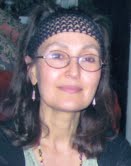
To Change or Not to Change
Selma Gokcen
“Change involves carrying out an activity against the habit of life.”
“You can’t do something you don’t know, if you keep on doing what you do know.”
—F.M. Alexander
Summers take musicians to new places where teachers and students meet for the first and sometimes the only time, and within this one or perhaps two or three encounters, Chance and Fate can open unexpected doors. Being out of our familiar circumstances and roles and away from the people we see every week in the same place—and for the same reason—provide just the right marinating sauce for Serendipity.
It was during a summer festival in Belgium that I met two Alexander teachers and had my first lesson. I wasn’t aware of the effect of that lesson at the time but four years later I was deep in the books and looking for a teacher. Six years later I was in a teacher training course in London. It all began in the dark; gradually as the journey winds its way forward, I can look back and understand the logic of the change. The heart knows the necessity but the head wants to know the reasons.
So back to the point of this piece. Change always visits from the Unknown, we cannot control it, we cannot predict it and we certainly cannot welcome it without some discomfort. What’s unfamiliar always feels wrong and sometimes frightening. That’s one of the tenets of the Alexander Technique. You cannot change and yet remain the same.
This summer I worked with a cellist who clutched her instrument, tucking it in so close that her breathing was affected. I used the analogy of ballroom dancing—First Principle: don’t hang onto your partner, otherwise you cannot move around the dance floor. And move we must with our cellos, but for someone who has learned to keep the cello close in, letting go of it and letting oneself be free at the same time felt so awkward and uncomfortable that it was hard for her to contemplate playing. I helped her to have the experience; whether she wants to go in that direction of more freedom depends upon her tolerance of the discomfort that such change inevitably brings.
Of course, the acceptance of change has to happen in small increments, gradually. That’s Nature’s way for living things, unless it’s destruction we are after. Change is disorienting, but how else can the New make itself known?
As musicians, our bodies are changing and ageing continuously, which means we have to find a way to go up against the force of gravity bearing down on us. I recently watched a film of Pierre Fournier playing Bach—already a man of a certain age, he nevertheless is beautifully lengthened upwards as his arms and fingers move towards and away from his back. It’s a sight one rarely sees on the concert platform today, but it was normal for cellists of that period, who had grown up in the pre-automotive and pre-digital age. Today we have to take lessons to recover what was once normal and natural. My teachers refer to this as degeneration, not regeneration—a loss of the life force.
I treasure the Alexander Technique because it provides a principle, a point of reference by which we can keep our own instrument, the Self, in good working order. And it is a constant principle, allowing us to accommodate ever-changing life without losing our upward orientation and therefore our way forward.
———————————————————————-
Leap Before You Look
The sense of danger must not disappear:
The way is certainly both short and steep,
However gradual it looks from here;
Look if you like, but you will have to leap.
Tough-minded men get mushy in their sleep
And break the by-laws any fool can keep;
It is not the convention but the fear
That has a tendency to disappear.
The worried efforts of the busy heap,
The dirt, the imprecision, and the beer
Produce a few smart wisecracks every year;
Laugh if you can, but you will have to leap.
The clothes that are considered right to wear
Will not be either sensible or cheap,
So long as we consent to live like sheep
And never mention those who disappear.
Much can be said for social savoir-faire,
But to rejoice when no one else is there
Is even harder than it is to weep;
No one is watching, but you have to leap.
A solitude ten thousand fathoms deep
Sustains the bed on which we lie, my dear:
Although I love you, you will have to leap;
Our dream of safety has to disappear.
—W. H. Auden
Subjects: Playing Healthy, Practicing
